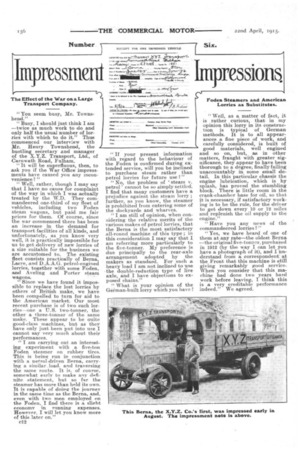Impressment Impressions.
Page 16

If you've noticed an error in this article please click here to report it so we can fix it.
The Effect of the War on a Large Transport Company.
"You seem busy, Mr. Townshend."
" Busy, I should just think I am —twice as much work to do and only half the usual number of lor ries with which to do it." Thus commenced our interview with Mr. Henry Townshend, the bustling secretary and manager of the X.Y.Z. Transport, Ltd., of Carowath Road, Fulham.
" It will be superfluous, then, to ask you if the War Office impressments have caused you any MCOrtvenience ? "
"Well, rather, though I may say that I have no cause for complaint of the way in which I was a,ctually treated by the W.D. They commandeered one-third of my fleet of vehicles, including two Foden steam wagons, but paid me fair prices for them. Of course, since the war commenced there has been an increase in the demand for transport facilities of all kinds, and unfortunately, as you know very well, it is practically impossible for us to get delivery of new lorries of a size suitable for the business we are accustomed to. The existing fleet consists practically of Berna, Lacre, and D.A.A,G. petrol-engined lorries, together with some Foden, and Aveling and Porter steam wagons.
" Since we have found it impossible to replace the lost lorries by others of British make, we have been compelled to turn for aid to the American market. Our most recent purchase is of two such lor ries—one a U.S. two-tonner, the other a three-thnner of the same make. These appear to be ouite good-class machines, but as they have only just been put into use I cannot say very much about their performances.
"I am carrying out an interesting experiment with a five-ton Foden steamer on rubber tires. This is being run in conjunction with a petrol-driven Berna, carrying a similar, load. and traversing the same route. It is. of course, somewhat early to make any definite statement, but so far the steamer has more than held its own.
It is capable of doing the journey in the same time as the Berna, and, even with two men employed on the Foden, I find there is .a slight economy in rimning expenses. However. I will let you know more of this later on."
"If your present information with regard to the behaviour of the Foden is confirmed during extended service, will you be inclined to purchase steam rather than petrol lorries for future use ? " "No, the problem of 'steam v. petrol' cannot he so simply settl.A. find that many customers have a prejudice against the steam lorry ; further, as you know, the steamer is prohibited from entering some of the dockyards and wharves.
"lam still of opinion, when considering the relative merits of the various makes of petrol lorries, that the Berna is the most satisfactory all-round machine of this type ; in this consideration I may say that I am referring more particularly to the five-tonner. My preference is due principally to the rear-axle arrangement adopted by the makers as standard. For such a heavy load. I am not inclined to use the double-reduction type of live axle, and I have objections to exposed chains."
What is your opinion of the German-built lorry which you have ? Foden Steamers and American Lorries as Substitutes.
I" Well, as a, matter of fact, it is .rather curious, that in my opinion this lorry in its construction is typical of German methods. It is to all appearances a fine piece of work, and carefully considered, is built of good materials, well engine(' and so on, but, as in other matters, fraught with greater significance, they appear to have been thorough to a degree, finally failing unaccountably in some small detail. In this particular chassis the engine lubrication, which is by splash, has proved_ the stumbling block. There is. little room in the crank-chamber base for oil, so that it is necessary, if satisfactory working is to be the rule, for the driver to get down every 10 or 12 miles and replenish the oil supply to the engine."
" Have you any news of the commandeered lorries ? "
"Yes, we have heard of one of them at any rate—the oldest Berna —the original five-tonner, purchs4ed in 1912 (by the way I can let you have a photograph of it), and I Understand from a correspondent at the Front that this machine is still giving remarkably good service. When you consider that this machine had done two years hard work before leaving, I think this is a very creditable performance indeed." We agreed.




















